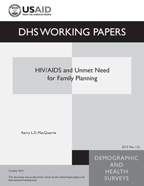- PUBLICATIONS
- JOURNAL ARTICLES
- ORDER PUBLICATIONS
Publications Summary
- Document Type
- Working Papers
- Publication Topic(s)
- Family Planning, HIV/AIDS
- Country(s)
- Cameroon, Cote d'Ivoire, Gabon, Kenya, Lesotho, Malawi, Namibia, Rwanda, Eswatini, Togo, Zambia, Zimbabwe
- Language
- English
- Recommended Citation
- MacQuarrie, Kerry L.D. 2015. HIV/AIDS and Unmet Need for Family Planning. DHS Working Papers No. 122. Rockville, Maryland, USA: ICF International.
- Download Citation
- RIS format / Text format / Endnote format
- Publication Date
- October 2015
- Publication ID
- WP122
There is no printed copy available to order.
